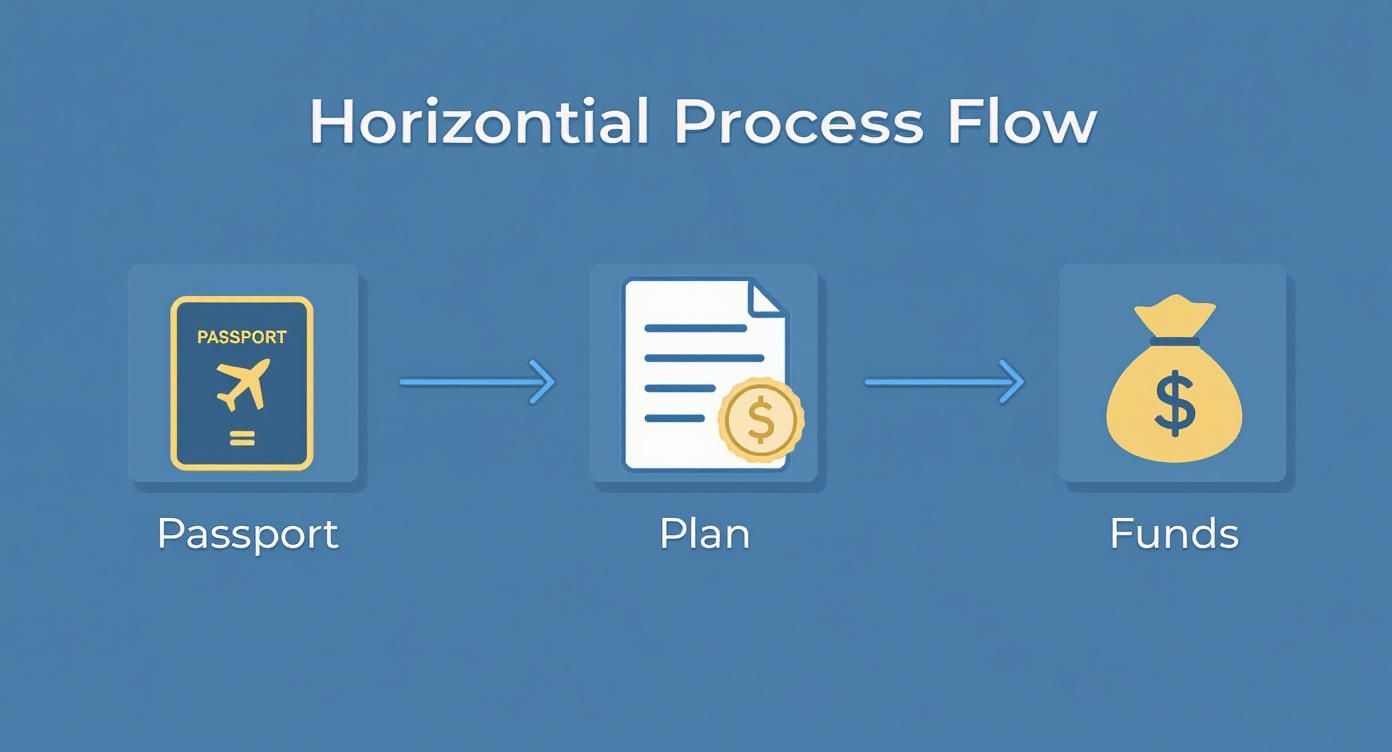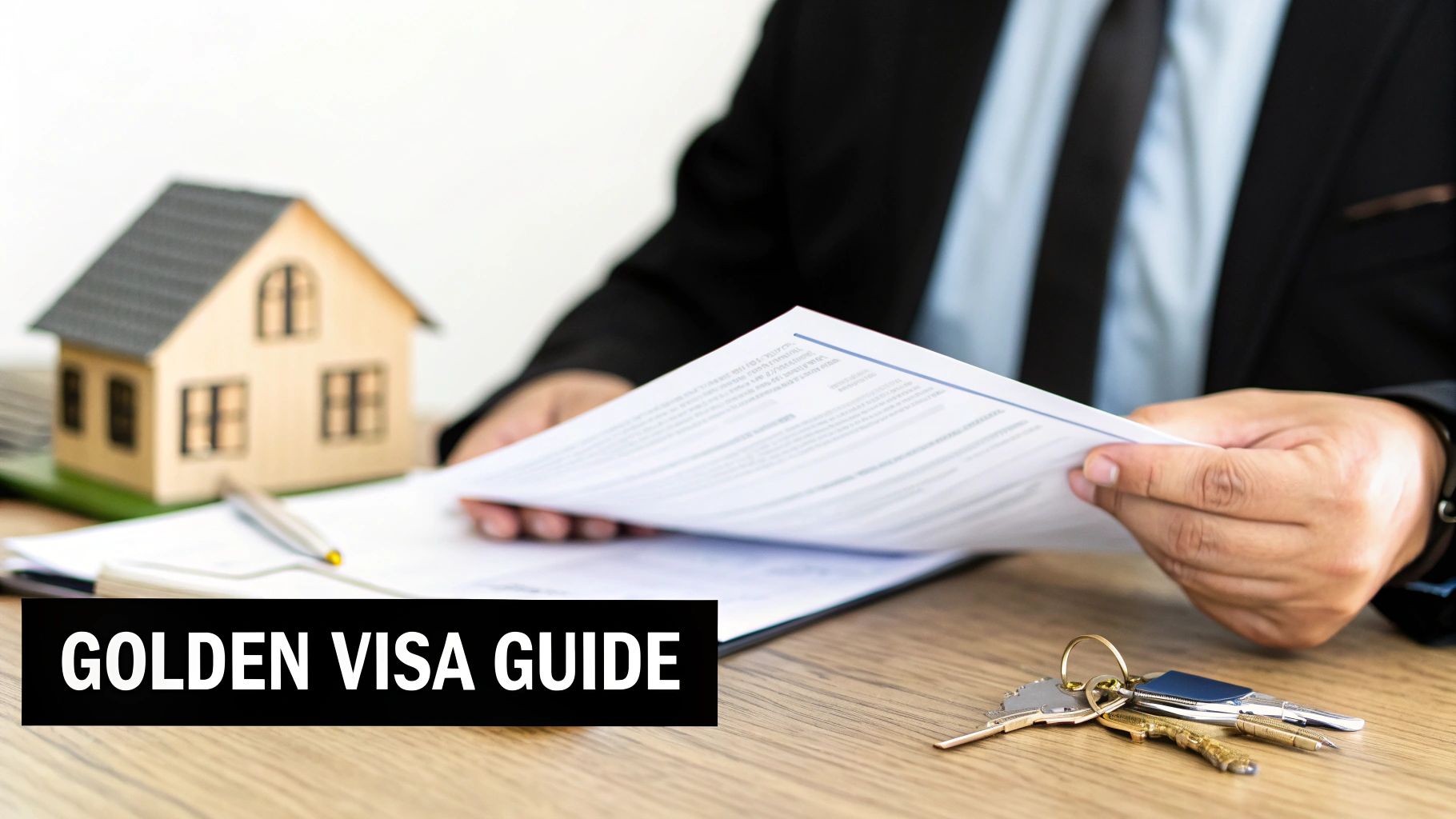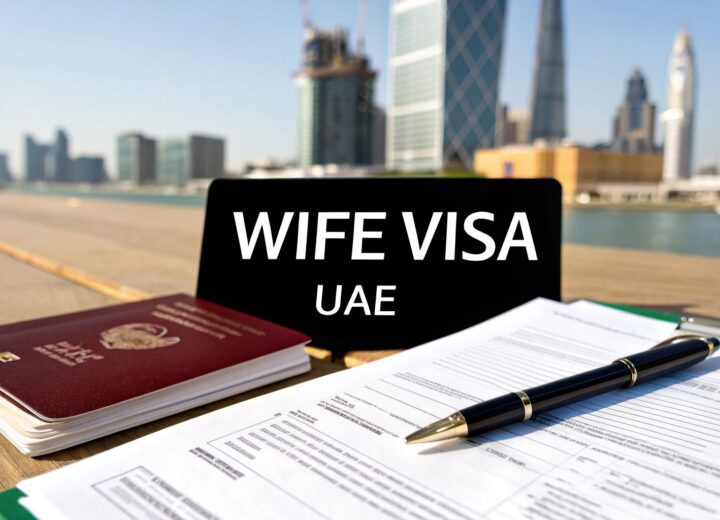Getting your Dubai business visa sorted is the first real step into one of the world's most exciting economies. But before you even think about the application, you need to pick the right visa category. This isn't just a box-ticking exercise; it's a decision that will shape your company's legal setup, your future residency status, and even your ability to bring your family over. It’s all about matching your business goals with the correct legal framework from day one.
Choosing the Right Dubai Business Visa

You have to get your head around the small differences between the various business visas. The path you take isn't just about the paperwork—it's a strategic move that sets the foundation for your entire UAE operation. Whether you're launching a slick tech startup in a Freezone or a bustling trading company on the Mainland, the right visa is your ticket to success.
For most entrepreneurs, the main options are the Investor Visa and the Partner Visa. Then there's the prestigious Golden Visa, an elite long-term choice. Each one is designed for a specific purpose and links directly to certain business activities and company structures. Choosing incorrectly can create headaches and operational limits later on.
Investor Visa Versus Partner Visa
At first glance, the Investor and Partner visas can look pretty similar. The key difference, though, comes down to one thing: your company's ownership structure. It's a simple distinction, but getting it right is critical for staying compliant.
An Investor Visa is what you’ll get if you're the sole owner of a business. Think of a Sole Establishment or a Free Zone Establishment (FZE). This visa essentially confirms your status as the primary person putting capital into your own company, granting you residency based on that role.
On the other hand, a Partner Visa comes into play when your company has two or more shareholders. This is the standard for Mainland Limited Liability Companies (LLCs) or Free Zone Companies (FZCOs). In this setup, every shareholder is considered a partner, and each one is eligible for a Partner Visa.
Here’s a practical example: a solo consultant starting their business in Sharjah Media City Freezone would apply for an Investor Visa. But if two people team up to launch a trading company in Dubai Mainland, they would both need to get Partner Visas. For a closer look at the investment side of things, it’s worth diving into the specific UAE Investor Visa requirements to make sure your plans are on the right track.
Mainland and Freezone Company Considerations
Whether you set up on the Mainland or in a Freezone will have a massive impact on your business visa. This is one of the biggest calls you'll make, as it determines exactly where and how you can do business.
-
Mainland Company Formation: If you set up on the Mainland in Dubai, Sharjah, or Abu Dhabi, you can trade directly with the local UAE market without any restrictions. This is perfect for businesses like retail shops, restaurants, or local service providers. A Mainland licence usually means getting a Partner Visa if there's more than one owner.
-
Freezone Company Formation: Freezones are special economic zones that offer some fantastic perks, like 100% foreign ownership and zero corporate tax. With over 40 Freezones across the UAE, many are tailored to specific industries like tech, media, or commodities. This is a great choice for international entrepreneurs whose main business is outside the UAE, like import/export or global consulting.
The most important thing is to let your business activity guide your choice. A digital marketing agency with clients all over the world would be a natural fit for a Freezone. A construction company, however, absolutely needs a Mainland licence to operate within Dubai.
The Golden Visa for Long-Term Ambition
For entrepreneurs with bigger investment plans or those with exceptional skills, the UAE Golden Visa is the ultimate residency goal. It’s a 10-year, renewable visa that offers incredible stability and perks, including sponsoring family and employees with much more flexibility.
Unlike the standard investor visas, the Golden Visa has much higher entry requirements. You'll typically need to make a significant investment in a UAE company, buy a property worth at least AED 2 million, or be recognized as an exceptional talent in your field. It's really designed for people who are serious about making a long-term contribution to the country. For investors looking to put down deep roots in the UAE, this visa is a powerful strategic asset.
Getting Your Documents in Order for a Dubai Business Visa
So, you've pinpointed the right visa for your business goals. Now comes the crucial part: gathering all your documents. This isn't just about filling a folder with paperwork; you're building a case for the UAE authorities, showing them who you are and why your business is a solid bet.
Getting this right the first time is everything. A tiny mistake—like a passport photo with the wrong background colour or a certificate that hasn't been properly stamped—can cause frustrating delays or even get your application rejected outright. The aim is to put together a perfect file that moves through the system without a single hiccup.
Core Personal and Business Documents
No matter if you're setting up on the Mainland or in a Freezone, every business visa application starts with a core set of personal documents. Consider these the foundation of your entire application.
Here's what you'll absolutely need:
- Passport Copies: You'll need clear, high-quality colour copies. Make sure your passport is valid for at least six months and has plenty of blank pages for the new visa stamp.
- Passport-Sized Photographs: These have to meet very specific UAE government rules. We're talking a white background, a neutral expression, and they must be recent. Don't even think about using an old photo; it’s a classic rookie mistake that gets applications bounced back immediately.
- Entry Permit or Visit Visa Copy: If you're already in the UAE on a tourist visa, you'll need a copy of it to start the "status change" process from within the country.
At the same time, you'll need to get your initial business paperwork sorted. This means getting the official approval for your company name and proposed business activity from the Department of Economy and Tourism (DET) or the relevant Freezone authority. This step basically confirms that your business idea is allowed and the name you've chosen is available.
Showing You Have a Solid Plan (and the Funds to Match)
Beyond your ID, the authorities need proof that your business idea is credible and that you have the money to see it through. This is where your application shifts from being just paperwork to a convincing business proposal. Vague financial documents are a major red flag for officials.
For an Investor Visa, for example, a bank statement is a must. This shows you have the capital to support yourself and get the business off the ground. The exact amount can vary, but a six-month bank statement is the standard request.
A well-written business plan is also key, especially for certain Freezones. It doesn’t have to be a novel, but it must clearly lay out your:
- Business goals and what you'll be doing
- Analysis of your target market
- Financial forecasts for the first couple of years
- Marketing and operations strategy
This document is your chance to prove you’ve done the research and are serious about adding value to the UAE's economy.
Insider Tip: Your business plan needs to feel real and tailored to Dubai. Generic, copy-pasted plans are easy to spot and can seriously weaken your application. Highlight what makes your business unique and why it will succeed here.
Why Document Attestation is a Deal-Breaker
One of the biggest hurdles for entrepreneurs coming from abroad is document attestation. Many of your official documents from back home—like a university degree, birth certificate, or marriage certificate—won't be accepted in the UAE as they are. They need to be legally verified first.
The process is a bit of a chain reaction: the document must be certified by the Ministry of Foreign Affairs in your home country, then by the UAE Embassy there, and finally stamped by the Ministry of Foreign Affairs (MOFA) here in the UAE. Our Attestation Services handle this complex process to make sure it's done correctly, saving you from potential delays.
In some cases, you might also need a No Objection Certificate (NOC). This is essentially a formal letter from a current sponsor (like an employer) stating they have no issue with you starting a business. To clear up any confusion, you can learn more about what a NOC is in the UAE and when it is needed to see if it applies to your situation. Having an experienced PRO guide you can make all the difference with these specific requirements.
Navigating The Visa Application Process
Once your documentation is in place and you’ve selected the right business structure, you’re ready to dive into the hands-on phase of your journey. This stage is like following a detailed itinerary—from company registration right through to collecting your Emirates ID. Miss one turn, and you could face delays down the road. Staying organised and always planning the next move is how you keep the process flowing.
Gathering core paperwork upfront is crucial. You’ll need:
- Your valid passport copy
- A well-crafted business plan
- Bank statements or proof of funds

This visual guide highlights the pillars of a smooth application: your identity, a clear commercial strategy, and verified finances. With these in hand, you’re ready to tackle official procedures.
The Initial Milestones: Trade Licence And Establishment Card
Securing your trade licence is the first real checkpoint. Whether you’ve opted for a Mainland setup or a Freezone hub, this licence is your legal green light to operate in the UAE. Our Mainland and Freezone company formation experts often compare it to laying a building’s foundation—everything else sits on top of it.
Immediately after, you’ll apply for the Establishment Card. This wallet-sized credential is issued by immigration authorities and officially registers your company for visa sponsorship. Without it, you can’t proceed to sponsor yourself, partners, or employees.
Your Entry Permit And Status Change
With the Establishment Card approved, the next swing is your entry permit. This document allows you to legally land in the UAE and begin your residency visa paperwork.
If you’re already on a tourist or visit visa, you can save yourself an exit-and-re-entry trip by requesting a “status change.” This swaps your visitor status to a prospective resident from within the country—a move many entrepreneurs choose to cut costs and time.
A single misplaced document can stall the entire process. Working with a Corporate PRO Services team ensures you sidestep common pitfalls and keep your timeline on track.
The Mandatory Medical And Biometrics Appointments
Once your status is updated, two in-person visits lie ahead. First is the medical fitness test. At a government-approved centre, you’ll undergo a blood test and chest X-ray to meet health requirements. Express and standard result options are available.
Next comes your biometrics session. Here you’ll have fingerprints and a photograph captured for your Emirates ID. Book this in advance and bring along your entry permit plus original passport. Missing documents means another appointment—and more delays.
Final Visa Stamping And Emirates ID Collection
Having cleared medical and biometrics checks, you submit your passport for visa stamping. Immigration officials then place the residency visa sticker inside—it’s the moment your business visa Dubai becomes official.
Dubai’s recent visa quota reforms mean:
- Businesses can request quota expansions based on compliance, office size, and genuine operational needs
- Approvals often occur within one business day
- Average processing time for work permits and residency visas is now five business days
You can explore more about how the Dubai visa quota system works and how it can fuel your company’s growth.
Shortly after stamping, you’ll get a notification to pick up your Emirates ID card. At this point, you’re fully set to live and run your business in the UAE.
Business Visa Application Timeline Overview
Below is a quick summary of each stage in the Dubai business visa application process and how long you can expect to wait at each step.
| Stage | Description | Estimated Timeframe |
|---|---|---|
| Trade Licence Application | Submit documents to Freezone or Mainland authority | 1–3 business days |
| Establishment Card Registration | Register company with immigration | 2–4 business days |
| Entry Permit / Status Change | Apply for entry permit or switch visa status within UAE | 3–5 business days |
| Medical Fitness Test | Complete health screening at approved medical centre | 1–2 business days |
| Biometrics Appointment | Provide fingerprints and photo for Emirates ID | 1 business day |
| Visa Stamping | Submit passport for residency visa sticker | 2–3 business days |
From initial formation to Emirates ID in hand, this timeline ensures you know what’s next—avoiding surprises and bottlenecks.
With a clear roadmap and the right support, the Dubai business visa path becomes not just manageable but predictable. Once your Emirates ID is issued, you’re officially ready to hit the ground running.
Budgeting for Your Dubai Business Visa
Getting your finances in order is probably the most critical part of setting up your business in Dubai. A clear, realistic budget is your best defence against unexpected costs that can stall your progress before you even get started.
When you think about the cost of a business visa Dubai, it's easy to focus just on the visa stamp itself. But the reality is that the total investment is much broader, covering a whole range of government and administrative fees linked directly to your company formation. Knowing these costs upfront helps you map out your funds properly.
Broadly speaking, you're looking at two main types of expenses: the one-time setup fees to get you off the ground, and the recurring costs to keep you running. Let’s dig into what you should be setting aside, whether you're going for a Mainland or a Freezone company.
Core Government and Administrative Fees
No matter where you decide to set up your company, you'll run into a series of mandatory government charges. These are non-negotiable and form the financial bedrock of your business setup.
Here’s a quick rundown of the primary costs to factor in:
- Trade Licence Fee: This will likely be your single biggest initial expense. The cost varies a lot depending on your jurisdiction (Mainland vs. Freezone), what your business actually does, and your legal structure.
- Establishment Card Fee: It's a small fee, but this card is essential. It officially registers your company with the immigration authorities, which is what allows you to start sponsoring visas.
- Visa Application and Stamping Fees: These are the direct costs for processing your entry permit and getting the final residency visa stamped into your passport.
- Medical Test and Emirates ID: Every resident has to go through a mandatory medical fitness test and apply for an Emirates ID card, both of which have their own fees.
Keep in mind, these are just the official government-mandated fees. It's the "hidden" or overlooked expenses that often catch people out. This is exactly why a detailed financial plan is so crucial for a smooth setup.
Essential Related Expenses to Consider
Beyond the government-mandated price tags, there are other costs that are just as important for a successful launch. Forgetting about these can put a real strain on your budget and cause serious delays.
One of the smartest investments you can make early on is getting professional support. Corporate PRO Services are invaluable for navigating the maze of government paperwork and procedures. A good PRO team will handle all the liaison, make sure your documents are correct, and keep you compliant. The time and potential mistakes they save you are well worth the cost.
You'll also need to think about Attestation Services. If any of your key documents—like your university degree or marriage certificate—are from outside the UAE, they have to be legally verified. This is a multi-step process involving various authorities, and it has to be done before the UAE government will accept them. To make sure you've covered all your bases, it’s a good idea to work through a comprehensive business relocation checklist.
Cost Estimates Mainland vs Freezone
Your choice between a Mainland and a Freezone company will have a huge impact on your total startup costs. Freezones often look cheaper on paper with their bundled packages, but a Mainland setup gives you the freedom to trade directly with the entire UAE market—a massive long-term advantage you shouldn't ignore.
Here’s a rough comparison to give you an idea for your budget:
- Freezone Setup: Often marketed as cost-effective business setup solutions, you'll find Freezone packages starting from AED 15,000 and going up to AED 35,000+. These packages usually cover your trade licence, eligibility for one visa, and basic registration.
- Mainland Setup: A Mainland company will generally start in the range of AED 25,000 to AED 50,000+. The final figure really depends on your business activity, as some require approvals from multiple government departments, each adding to the cost.
At the end of the day, the best way forward is to partner with a setup specialist who can give you a detailed, tailored quote based on exactly what you need. And with 24/7 support service available, you can get clear answers on costs whenever questions pop up, ensuring your financial plan is solid from day one.
Unlocking the UAE Golden Visa for Entrepreneurs

For entrepreneurs with serious, long-term ambitions in the UAE, the Golden Visa isn't just an upgrade—it's a game-changer. Think of it less as a simple residency permit and more as a strategic asset. It provides unmatched stability and sends a clear signal that you're here to contribute to the nation's economy in a big way.
Unlike a standard investor visa, which is often tied to a single company, the Golden Visa grants a 10-year renewable residency. This disconnects your personal residency status from your company's day-to-day operations, giving you a powerful safety net. It’s the kind of security that allows for confident, long-range business planning, making it the ultimate goal for established business owners looking to truly put down roots.
Pathways to Golden Residency for Entrepreneurs
Getting your hands on a Golden Visa means meeting specific, high-level criteria. The government has laid out several clear routes for investors and talented individuals, ensuring the programme attracts people who can genuinely add value.
The most common pathways for business leaders include:
- Real Estate Investment: This is a popular option. It involves purchasing a property in the UAE worth at least AED 2 million. The rules have even become more accessible recently, removing a previous requirement for a substantial upfront down payment.
- Company Investment: You can also qualify by investing a minimum of AED 2 million into a new or existing business in the UAE. This route requires you to provide clear proof of the investment and maintain it for a set period.
- Exceptional Talent and Innovators: This isn't just for investors. If you have a proven track record in fields like science, technology, or the arts, this category is for you. You'll need an endorsement from a relevant government body to validate your skills.
The UAE is clearly all-in on this programme. The number of Golden Visas issued has skyrocketed, with Dubai alone granting roughly 158,000 by 2023. That’s a massive leap from 47,150 back in 2021, showing how the initiative has grown to welcome top-tier professionals alongside traditional investors.
The Real-World Benefits for Your Business and Family
The perks of holding a Golden Visa go far beyond just a long-term stay. It unlocks a whole suite of benefits that directly support your business and improve your family's quality of life, simplifying countless aspects of living and working here.
One of the biggest advantages is the enhanced sponsorship power. Golden Visa holders can sponsor their spouses and children—regardless of age—and an unlimited number of domestic staff. This makes it so much easier to relocate your entire family and settle in comfortably. You can even sponsor key employees, which adds a layer of stability for your core team.
Holding a Golden Visa means you can stay outside the UAE for extended periods without your visa becoming invalid. This offers unparalleled freedom for international entrepreneurs who need to travel frequently for business.
For a deep dive into all the requirements, check out our complete guide on https://prodesk.ae/golden-visa-uae-eligibility/. Our team is always ready to look at your specific situation and find the best path for you. And once you're settled in, it's smart to get familiar with the local digital environment; this guide on understanding internet restrictions and VPNs in the UAE can be a helpful resource.
Got Questions About Dubai Business Visas? We Have Answers.
As you get closer to launching your business in Dubai, it's completely normal for a few questions to come up. Thinking about the final visa steps, what happens at renewal time, or how to handle unexpected hiccups can feel a bit overwhelming. We get these questions all the time, so let's clear them up and give you the confidence to handle whatever comes your way.
Can I Switch from a Tourist Visa to an Investor Visa While in the UAE?
Yes, you absolutely can. In fact, it's one of the most common ways entrepreneurs finalise their residency. The official term for this is an "in-country status change," and it’s a lifesaver—saving you from having to fly out of the UAE and back in again on the new permit.
Here’s how it works: Once your company’s trade licence and Establishment Card are officially issued, your PRO can apply for your investor residency permit. As soon as that’s approved, you complete the status change. It’s a straightforward administrative step that switches your legal status from visitor to resident, letting you move straight on to your medical test and Emirates ID biometrics without ever leaving the country.
Opting for an in-country status change is just smart. It's faster, way more efficient, and lets you keep your focus on what really matters—getting your business off the ground—instead of dealing with travel logistics.
What Happens If My Visa Application Is Rejected?
First off, don't panic. A visa rejection is frustrating, but it’s rarely a dead end. The most important thing is to figure out exactly why the application was turned down. The challenge is that immigration authorities don't always give you a detailed breakdown, which is why having experienced Corporate PRO Services on your side is critical. A good PRO team can talk to the authorities and get the real story.
Some of the usual suspects for rejection include:
- Paperwork Problems: A missing signature, a blurry passport copy, or certificates that haven't been properly attested are very common culprits.
- Security Flags: Sometimes, an application gets flagged for a routine security check, which can cause delays or a temporary rejection while they sort things out.
- Medical Test Failure: Unfortunately, failing the mandatory medical fitness test leads to an immediate rejection.
Once you know the reason, you can usually fix the problem and re-apply. For example, if a document was missing, you just resubmit the application with the complete file. We can walk you through the resubmission to give you the best possible shot at getting it approved the second time around.
How Does the Visa Renewal Process Work?
Good news: renewing your Dubai business visa is a lot simpler than applying for it the first time. The general steps are pretty similar for both Investor Visas and Golden Visas, though of course, the Golden Visa gives you a much longer stretch between renewals.
You'll typically need to:
- Renew Your Company Licence First: Your visa is linked directly to your company. So, you must renew your trade licence and Establishment Card before anything else.
- Do Another Medical Test: A new medical fitness test at an approved health centre is required.
- Update Your Emirates ID: You’ll also need to renew your Emirates ID card. These days, this can often be done at the same time and place as your medical test.
It’s best to kick off the renewal process about 30 days before your current visa expires. This gives you plenty of time and helps you avoid any last-minute stress or fines. As long as you stay organised, it’s a smooth ride.
Can I Sponsor My Family on a Business Visa?
Yes, and this is one of the biggest advantages of getting a business visa Dubai. Once your own residency visa is stamped in your passport, you can start the process of sponsoring your spouse and children. You can even sponsor your parents, as long as you meet the minimum salary requirements and can show you have adequate housing for them.
You’ll need to provide documents like attested marriage and birth certificates, along with passport copies and photos for each family member you're sponsoring. Our team often handles family visas right alongside the main investor visa, making sure the entire family can settle into their new life in the UAE together, without any hassle.
✅ Specialists in Mainland Company Formation in Dubai, Sharjah & Abu Dhabi
✅ Specialists in Freezone Company Formation across the UAE
✅ Specialists in Golden Visa on Property and Investor Visa
✅ Specialists in Corporate PRO Services and Attestation Services
✅ 24/7 Support Service – Always here when you need us
✅ Cost-Effective Business Setup Solutions tailored to your needs
✅ Enjoy UAE Tax Benefits for International Entrepreneurs
📞 Call Us Now: +971-54-4710034
💬 WhatsApp Us Today for a Free Consultation





